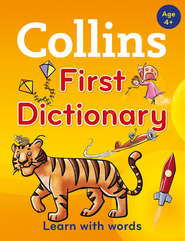По всем вопросам обращайтесь на: info@litportal.ru
(©) 2003-2025.
✖
Collins Primary Grammar, Punctuation and Spelling
Автор
Год написания книги
2019
Настройки чтения
Размер шрифта
Высота строк
Поля
People have lived in this place for hundreds of years.
Object
The object is the person or thing that has the action of the verb done to it. It is a noun, a noun phrase or a pronoun. It comes after the verb. Not all sentences have an object.
Kim loves chocolate.
I have lost my new green rucksack.
Are you going to ask him to the prom?
Complement
A complement is a word or phrase that tells you something about the subject of the sentence. It is a noun, a noun phrase, an adjective or an adjective phrase. Not all sentences have a complement. The verbs be, become, feel and seem need a complement.
Laura is an architect.
They became very good friends when they worked together.
The boys felt silly when they had to dress up.
She seems perfectly happy.
Adverbial
An adverbial can be an adverb, an adverb phrase, a preposition clause or a subordinate clause. It tells you something about how the action in the sentence is happening, for example when it is happening, where it is happening, how it is happening, how often it is happening or why it is happening. Not all sentences have adverbials.
Suddenly, it started to rain heavily.
Breathing quietly, Lee crept out of the room.
You probably won’t notice it after a while.
I’ll make a cup of tea when I’ve finished reading this.
An adverbial can go anywhere in a sentence:
I greatly admire your courage.
The door closed with a loud bang.
Honestly, I didn’t mean to be rude to you.
When the adverbial is at the start of the sentence it is called a fronted adverbial. These are followed by a comma:
Seriously, are you wearing that?
At the end of the match, the players shook hands.
Bitterly disappointed, the home supporters left the stadium quickly.
When the cake is golden brown, take it out of the oven.
Active voice and passive voice
There are two different ways of presenting the same information in a sentence. These are the active voice and the passive voice. In the active voice, the subject of the sentence does the action:
In the passive voice, the subject of the sentence has the action done to it:
The passive voice uses be with the past participle of the verb:
is being fed
was chased
It usually sounds more natural to use the active voice when you are writing, but sometimes it is good to use the passive voice if you do not know who did something or you do not want to blame someone.
The bus shelter has been vandalised.
The front door has been left open again.
Making words (#ulink_57930209-4877-5451-a3bf-0f2fd85cfc66)
English is very good at making new words from existing words. This can be done by putting words together or by adding prefixes and suffixes.
Prefixes
A prefix is a letter or group of letters that is added to the beginning of a word to make a new word. Adding a prefix to a word changes the word’s meaning. When you write a prefix on its own, you put a hyphen after it, for example un-. When you add the prefix to a word to make a new word, you do not keep the hyphen (except in a very few cases which you can see on pages 56 (#litres_trial_promo)–57 (#litres_trial_promo)):
un‑ + usual = unusual
un‑ + cover = uncover
un‑ + happiness = unhappiness
The prefix un- means ‘not’ so when you add it to a word you give it the opposite meaning:
un‑ + friendly = unfriendly (not friendly)
Other prefixes that do this are dis-, non- and in-:
dis‑ + agree = disagree
non‑ + fiction = nonfiction
in‑ + expensive = inexpensive
When you put in- before words that begin with certain letters, the n changes:











